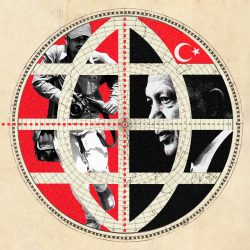Teona Tsintsadze
The year in conspiracy theories
A bumper crop of QAnon-aligned candidates ran for office during the U.S. midterms. Russia doubled down on its long-running bio lab conspiracy theory to justify its Ukraine invasion. Hard-right conspiracy theorists who would like Germany to recapture its moment of empire in 1871 staged a coup. It has not been a quiet year for conspiracy theories.
Russian bio labs
Shortly after Russia’s invasion of Ukraine on February 24, the internet was set alight with a pro-Russia conspiracy theory that the U.S. was running secret bioweapons labs on Russia’s borders. The theory was used as part of Russia’s justification for invading Ukraine, and was pushed by Russian state media before being picked up by online conspiracy theorists and QAnon adherents, as well as influencers like Alex Jones. Even British comedian and social commentator Russell Brand ran with the narrative, weighing in on the lie to his five-million-strong following. The myth that the U.S. is building bioweapons on Russia’s borders goes back years. Chinese officials and state media also promoted the conspiracy theory, using it as an opportunity to parrot its long-running claim that the U.S. was behind the Covid-19 pandemic.
The U.S. bioweapons narrative is nothing new. For years, the Kremlin has made extensive claims that the U.S.-owned Lugar Lab in Georgia — which monitors infectious diseases — was secretly running “germ warfare” operations, and has said it’s responsible for everything from Covid to the Zika virus to plagues of stink bugs. Thanks to this conspiracy theory, even biolabs in the U.S. itself are facing opposition and conspiracy claims. A new biolab in Kansas opened recently to study some of the world’s most dangerous pathogens. Though some concerns about the lab were legitimate, they were accompanied by a torrent of conspiracy theories, reminiscent of those in Ukraine, pushing the notion that the lab was really building bioweapons.
Anti-vaxxers refuse to back down post-Covid
At the outset of the year, Canadian truckers drove cross-country to participate in a standoff with the Canadian government, protesting Covid restrictions and vaccine mandates. Their action inspired motorists in France, Israel, Finland, Australia and the Netherlands to stage similar protests demanding an end to pandemic measures. Many of the “Freedom Convoy” social media groups were being run by fake accounts tied to content farms in Vietnam, Bangladesh and Romania. They were heavily endorsed by QAnon influencers, and QAnon logos were seen emblazoned on trucks during the protests, while other organizations among the truckers claimed that the pandemic had been orchestrated by Bill Gates with the intention of injecting 5G microchips into the population.
As most of the world returned to some semblance of normality after two years of Covid restrictions, you’d be forgiven for thinking that anti-vaccine activists might quiet down. But a new and terrifying trend emerged, in which hardline anti-vaccine adherents the world over staged a “battle over blood” and began refusing blood transfusions from vaccinated donors. Perhaps the most extreme example of this strange and scary phenomenon was a case in New Zealand, in which two sets of parents refused donor blood for their seriously ill children.
QAnon goes mainstream
The U.S. midterms saw record numbers of QAnon-linked candidates running for office. And candidates, including Arizona State Senator Sonny Borrelli, Texas Agriculture Commissioner Sid Miller and Arizona State Representative Leo Biasiucci, who have all been linked with the conspiracy movement or spoken at QAnon conventions, managed to win seats. Two darlings of the digital disinformation scene — Christian nationalist and QAnon devotee Doug Mastriano and Covid skeptic and celebrity doctor Mehmet Oz both lost their bids. In the recesses of Telegram and other social media platforms, QAnoners celebrated Elon Musk’s takeover of Twitter and began returning to the platform in their droves. Musk himself began tweeting QAnon-aligned messaging and using QAnon tactics, like accusing his critics of pedophilia, to bolster the support from his conspiracist fans.
The high tide of antisemitism
After antisemitic incidents in 2021 reached an all-time high, 2022 was no better. The rapper Kanye West faced a growing backlash after he spiraled into a public embrace of antisemitism with an ever-escalating series of outbursts targeting Jewish people. On conspiracy theorist Alex Jones’ show, he repeatedly praised Hitler and the Nazis, to the extent that Jones had to make a rare intervention by admitting “the Nazis did a lot of very bad things.” During his outburst, Kanye mentioned that 300 Zionists ran the world — borrowing directly a fringe conspiracy theory called “the Committee of 300” that is over a century old and was commonly used by the Nazis to justify their persecution of the Jews.
Reichsburger
The late-breaking entrant award among the conspiracy theorists of 2022 goes to the Reichsburger movement behind the attempted coup in Germany at the beginning of December. The hard-right movement, accused of plotting against the German government, adheres to a grab bag of conspiracy theories. It’s not unlike QAnon, but it also has uniquely German ideas, namely that the country should return to having a Kaiser and go back to the Germany of the 1800s. As a result, adherents to this moment call themselves “sovereign citizens” and don’t recognize the current state of Germany or its laws. The movement came into its own during the pandemic, when Reichsburger followers protested against Covid laws, and in doing so, merged with QAnoners and anti-vaccine advocates.
The story you just read is a small piece of a complex and an ever-changing storyline that Coda covers relentlessly and with singular focus. But we can’t do it without your help. Show your support for journalism that stays on the story by becoming a member today. Coda Story is a 501(c)3 U.S. non-profit. Your contribution to Coda Story is tax deductible.
















